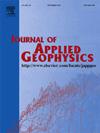Detection of low-contrast objects by electrical prospecting methods
Abstract
Many geological problems cannot be solved by electrical prospecting methods. Often the reason for this is a slight difference in the electrical resistivity of target objects from that of the host medium. At the same time, the use of the transverse magnetic (TM) type field makes it possible to identify low-contrast objects and delineate their boundaries with high accuracy. TM-type prospecting is more efficient since its signal is much more strongly affected by changes in resistivity and other electrodynamic parameters. The article examines one of the difficult cases – a search for kimberlite pipes in Yakutia. Such objects differ very little from the host medium in terms of the horizontal resistivity. Exploration works to search for kimberlite pipes in Yakutia, carried out by conventional electrical prospecting methods, have many problems. The article considers the results of successful TM-type prospecting field surveys where kimberlite pipes stood out very prominently. Also presented are the results of modeling an even more complex situation in which the pipes are located at depths of over 140 m and overlain by traps; there are many objects in the area that create additional anomalies.

 求助内容:
求助内容: 应助结果提醒方式:
应助结果提醒方式:


